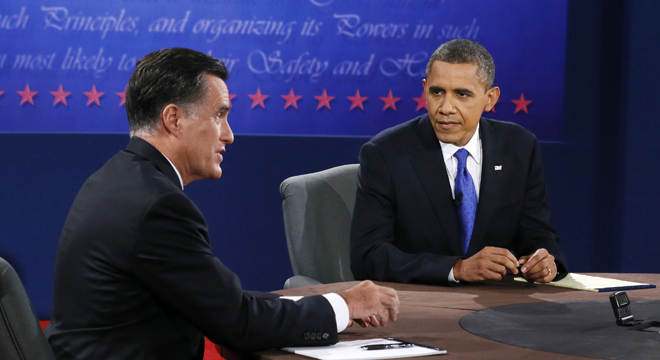As quickly became apparent, President Obama and Mitt Romney walked onto the debate stage at Lynn University with two very different strategies. Romney’s, to present himself as a steady moderate and not a return to the Bush era, and Obama’s, to attack Romney relentlessly as an untested and dangerous alternative.
Conservative foreign policy leaders couldn’t be more upset by Obama’s foreign policy. Throughout the campaign, they’ve accused Obama of being weak, feckless, appeasing, ill-informed and downright dangerous. Yet when Romney met Obama on stage in Boca Raton, it was often in the spirit of agreement.
The standout example was Afghanistan. Romney has attacked Obama for months over his stated withdrawal deadline for American troops at the end of 2014 but in recent weeks he’s put his plan for the future of Afghanistan more in line with Obama’s. That new tone was on display at Lynn University.
“We’re going to be finished by 2014, and when I’m president, we’ll make sure we bring our troops out by the end of 2014,” Romney said. “The commanders and the generals there are on track to do so. We’ve seen progress over the past several years. The surge has been successful and the training program is proceeding apace.”
Romney’s Afghanistan view was so close to Obama’s in that answer, he could have been a surrogate for the president in the spin room afterwards.
That wasn’t the only time it happened. In discussions of committing U.S. forces to Syria, whether to call for the ouster of Egyptian president Hosni Mubarak, the use of drones and other controversial foreign policy topics, Romney echoed Obama on the debate stage while emphasizing that he would achieve better outcomes.
This was a sensitive topic for Romney surrogates after the debate. Top Romney adviser Eric Fehrnstrom said that there were “sharp disagreements,” citing Romney’s willingness to arm Syrian rebels, for example. Former Massachusetts Lt. Governor Kerry Healey said Romney would add greater “credibility” to existing policy goals. Another Romney aide, Dan Senor, suggested Romney had “clear differences” on Iran and China, but that “on certain areas their assessment is going to be similar.”
Obama, who attacked early and often, said Romney “want[s] to import the foreign policies of the 1980s, just like the social policies of the 1950s and the economic policies of the 1920s.” He zinged Romney’s proposals for a larger Navy: “You mention the Navy, and how we have fewer ships than 1916. We also have fewer horses and bayonets, because the nature of our military has changed.”
Obama also appeared prepared for Romney’s emphasis on overlapping policies between the two candidates, frequently bringing up past statements by Romney to accuse him of lurching between positions.
“When it comes to going after Osama bin Laden, you said, well, any president would make that call,” Obama said. “But when you were a candidate in 2008, as I was, and I said if I got bin Laden in our sights I would take that shot, you said we shouldn’t move heaven and earth to get one man.”
Romney got some digs in too, accusing the president of an “apology tour” in 2009, an favorite line of his since early in Obama’s term.
“Mr. President, the reason I call it an apology tour is because you went to the Middle East and you flew to Egypt and to Saudi Arabia and to Turkey and Iraq. And by the way, you skipped Israel, our closest friend in the region, but you went to the other nations,” Romney said. “And by the way, they noticed that you skipped Israel.”
But his more conciliatory tone was clear from the first moments, when he surprisingly passed up an opportunity to attack Obama’s response to the Benghazi attack in Libya, a topic that tripped Romney up in the second debate.
By contrast, Obama left nothing on the table. In an extremely rare mention of his predecessor by name, Obama explicitly accused Romney of advocating a return to the policies of the Bush administration.
“Both at home and abroad, he has proposed wrong and reckless policies,” Obama said. “He’s praised George Bush as a good economic steward and Dick Cheney as somebody who shows great wisdom and judgment.”
The governor seemed to anticipate these comparisons by stressing earlier that he had no intention of going to war in the Middle East again. “We don’t want another Iraq, we don’t want another Afghanistan,” he said.
Following the debate, Romney adviser Senor, who served in the Bush administration, said these comparisons were unfair. After all, Obama shares many Bush policies himself, like renewing the PATRIOT Act, keeping Bob Gates as defense secretary and, in effect, keeping Guantanamo Bay open. As for where Romney breaks with Bush, Senor suggested he’d take a harder line on China and Russia.
“The fact that President Obama felt so desperate tonight to throw out the kitchen sink — Bush! Cheney! — he looked angry and he looked frustrated,” Senor told TPM in the post-debate spin room.






